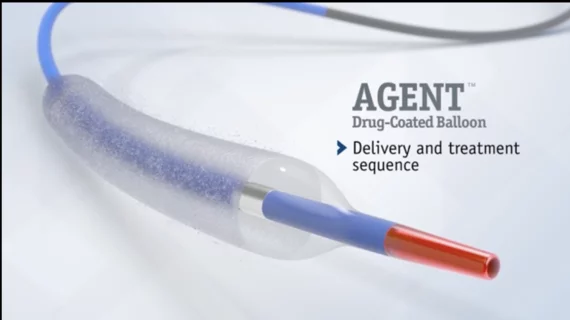FDA approves Boston Scientific’s new drug-coated balloon for coronary in-stent restenosis
Boston Scientific has received U.S. Food and Drug Administration (FDA) approval for its Agent Drug-Coated Balloon (DCB) for the treatment of coronary in-stent restenosis (ISR) in patients with coronary artery disease.
While percutaneous coronary intervention (PCI) technologies continue to evolve, recent research suggests ISR—the gradual re-narrowing of a previously opened coronary artery—is still seen in up to one in 10 patients following treatment. The Agent DCB targets the scar tissue with a therapeutic dose of the anti-proliferative drug paclitaxel designed to prevent ISR from reoccurring. Boston Scientific designed the new device to offer interventional cardiologists an alternative treatment option to repeat PCI or cardiac surgery.
“With more than 100,000 patients treated globally to date in both clinical and commercial settings, we are very pleased to introduce this proven therapy as the first drug-coated coronary balloon in the U.S,” Lance Bates, Boston Scientific’s president of interventional cardiology therapies, said in a statement. “The Agent DCB addresses a critical unmet need by providing a dedicated treatment option for the challenging condition of ISR and we look forward to offering U.S. physicians the opportunity to treat their patients with this novel device.”
The FDA’s decision was based largely on data from the AGENT IDE trial, which compared treatment with the Agent DCB to traditional balloon angioplasty. Robert W. Yeh, MD, MSc, MBA, an interventional cardiologist with Beth Israel Deaconess Medical Center, presented initial findings from AGENT IDE at TCT 2023, highlighting the fact that target lesion failure after one year was seen in 28.7% of balloon angioplasty patients and 17.9% of Agent DCB patients. The Boston Scientific device was also linked to a reduced risk of stent thrombosis, target lesion revascularization and target vessel myocardial infarction.
When Yeh presented these results at TCT, American College of Cardiology President B. Hadley Wilson, MD, described the news as a “game changer.”
“For 25 years, we’ve been trying to peel back this restenosis problem,” Wilson said at the time. “Now we can see light at the end of the tunnel. This is really terrific work.”
Final results from AGENT IDE will be presented at CRT 2024.
The Agent DCB has already been available in Europe and other parts of the world for years. According to Boston Scientific, this newly approved interventional device will be launched in the United States “in the coming months.”

